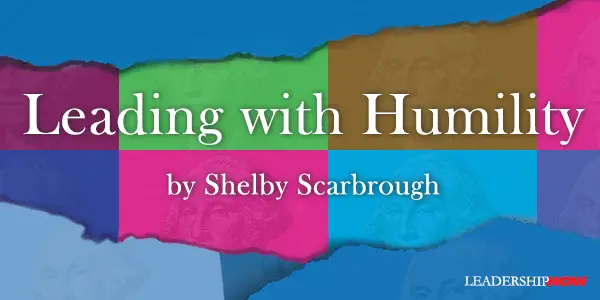 |
 |
10.21.22

Leading with Humility
STUDIES have shown that humility is one of the most important characteristics of successful leaders. A leadership expert wrote in Forbes magazine that “humble leaders listen more effectively, inspire great teamwork, and focus everyone (including themselves) on organizational goals.” The leader’s strongest tool is humility. It intensifies credibility. When I left the White House to work at the State Department protocol office, I was honored to bid farewell to President Reagan in the Oval Office in a “one on one.” (There’s actually a video of it floating around the internet—a little embarrassing since I fawned over him, but I meant every word I said and will remember the experience forever.) At the end of that special meeting, he presented me with a replica of the plaque displayed on his desk: There is no limit to what a man can do or where he can go, as long as he does not care who gets the credit. I took those words to heart, although sometimes it can be hard to live up to such an ideal. I often reflect on Reagan’s example of humility and generosity of spirit. He was an extraordinary human being and larger than life—a former movie star, governor of California, and ultimately leader of the free world—but he treated everyone with respect and courtesy and made everyone feel valued. He was not falsely modest—Reagan was aware of his exceptional gifts, his purpose, and his significant role in history—but he was, deep to his core, a gracious and humble man. One of the most approachable leaders I had the pleasure of working with was Nelson Mandela. My friend Bill Sittmann (may he rest in peace) was the executive secretariat at the National Security Council in the George H. W. Bush White House. Nelson Mandela had been recently released from his long prison term in South Africa. I had just started my business, Practical Protocol, so Bill referred me to the group organizing Mr. Mandela’s visit to the United States. They hired me to organize the visits to the White House, the State Department, and Capitol Hill. It was a tremendous honor and incredible opportunity to spend just a little time with the Nelson Mandela. Was he as advertised? Absolutely. Charming, kind, soft-spoken, and very approachable—in a word, humble. Even then I could feel how lucky I was to have the chance to work for and to serve such amazing individuals. I was deeply humbled in the process. Think of other great leaders: Martin Luther King Jr., Gandhi, Mother Teresa, Abraham Lincoln. None of them believed they were more important than their messages, nor more valuable than those who followed them. They engaged, empowered, and inspired others because they were humble. They lived to be in service to others. They did not seek credit or admiration for their work, but neither were they weak or passive. Their humility supported a boundless strength of character that created the environment for so many people to trust in them, believe in their causes, and help them achieve their goals. We might think that humility is the opposite of hubris (excessive pride or self- confidence; arrogance that ultimately leads to a downfall). However, we can think of humility as the ballast or center of a seesaw. Humility balances out the extreme characteristics of hubris and lack of self-worth. We are at our best selves when we understand that we are “not nothing” but rather that we are “not everything”! We are just one part of a larger part of the infinite. People with hubris arrogantly believe that their way is the only way and that they are the only ones who know how to accomplish something. Shakespeare’s Macbeth is a classic literary example of hubris and its consequences. Today, we might point to the despicable Jeffrey Epstein as the ultimate symbol of hubris. He and those he collaborated with thought themselves untouchable. We see what became of him. As of this writing, we have not yet witnessed the inevitable downfall of all those associated with him. There will be a price to pay for hubris—there always is. Humility doesn’t require us to abandon our self-confidence; Lincoln was not insecure, and he knew he was up to the task. But he respected and appreciated the strengths of others, and always sought the counsel of his cabinet before making a significant decision. A recent study found that gratitude and humility are self-reinforcing. If we are truly grateful, we receive an understanding of our place in the mix of all humanity. Offering our best qualities to the world while honoring those of others can humble us and help dissipate the destructive energies that are taking up so much space in the world. Humility doesn’t care about winning points, keeping score, or seeking approval from any outside source. The same can be said of the civil life in general: civility isn’t about getting credit for doing the right thing. To me, it’s about developing character and integrity that resolutely reside within us and then listening to that inner voice, our conscience. If we do this, with none the wiser, we succeed in exhibiting what I now consider the core component of civility: humility.  
Posted by Michael McKinney at 10:07 AM
|
BUILD YOUR KNOWLEDGE
 

How to Do Your Start-Up Right STRAIGHT TALK FOR START-UPS 
Grow Your Leadership Skills NEW AND UPCOMING LEADERSHIP BOOKS 
Leadership Minute BITE-SIZE CONCEPTS YOU CAN CHEW ON 
Classic Leadership Books BOOKS TO READ BEFORE YOU LEAD |